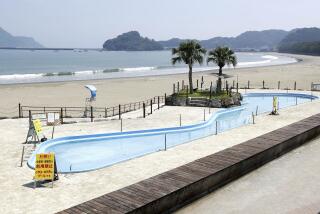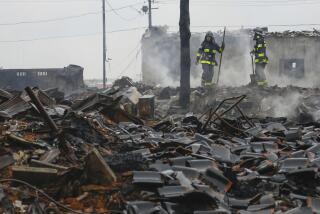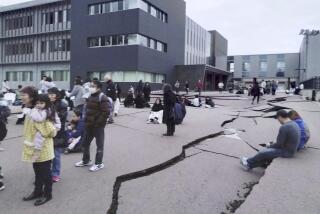In Japan, Tokyo’s lights voluntarily dimmed after quake
Reporting from Tokyo — It’s hard to imagine this city without its trademark blaze of neon — the garish, flashing signs that routinely turn the Tokyo nightscape into a phantasmagoric riot of color. On Sunday night, though, little imagination was needed.
Tokyo didn’t go dark. But it dimmed itself, a voluntary power conservation measure after Friday’s catastrophic earthquake. Even what may be the city’s most iconic structure, the 1,092-foot Tokyo Tower, turned out the lights.
In the city’s most neon-heavy precincts, Shinjuku and Ginza, people strolling the sidewalks on a cool, clear evening eyed the surrounding skyscrapers, pointing out to each other the gaps in what is normally a hallucinogenic, strobe-lit stream of images and Japanese-language characters. The unlit patches stood out like missing teeth.
Photos: Scenes of earthquake destruction
Japanese officials announced that Monday, the first full day of a workweek since the quake, would bring rolling blackouts to much of the country, possibly including central Tokyo. But they appealed to businesses not to wait to pull the plug, urging self-imposed restraint on power use, particularly at night when shortages are expected to be most acute.
Even on a weekend, many of Japan’s corporate citizens took note. “Management’s orders” was the mantra at many spots that are customarily lit with cartoonish intensity: movie theaters, pachinko parlors, fast-food joints, karaoke bars that normally beckon would-be crooners from blocks away.
“Well, every little thing people can do to help is good,” said Yuichi Morita, a construction worker who nonetheless looked a bit crestfallen that the neon-emblazoned gaming arcade he frequents a few times a week had closed its doors early — and turned off the exterior lights, as if on cue, just as he arrived.
Convenience stores, ubiquitous in the capital, jumped on the turn-it-off bandwagon. Two of the largest chains, 7-Eleven and Lawson, began using minimal outside lighting, with only a single illuminated sign so customers would know they were open.
With many Japanese vowing to pull together in this time of adversity, voluntary power conservation suddenly became a way of showing solidarity with victims of the harrowing quake.
“I told my father,” recounted a Twitter narrative from a poster calling herself Ms. Yokoyama. “He didn’t say a thing; stood up, walked around the house and pulled out power plugs of appliances we weren’t using.
“Normally, he doesn’t care a thing about energy conservation, and leaves TVs and lights on even when he’s not using them,” she continued. “His silent action touched my heart.”
Another Twitter user in quake-hit Iwake prefecture responded with delight when the power was restored, crediting others’ forbearance. “Here comes the light!!” said a poster named Min. “Thank you for everyone who cooperated to save on electricity!!”
Not everyone was on board. The VIP Girls Bar in Shinjuku, which could politely be called a hostess bar, was defiantly emblazoned from the ground floor to the second story.
Photos: Scenes of earthquake destruction
A doorman-bouncer in a black suit sighed about the government’s admonitions.
“We can’t just shut off the lights; it would be rude to customers!” he said. “And bad for business.”
Related:
Earthquake shifted Earth on its axis
Japan faces toughest crisis since WWII, prime minister says
Japan’s massive earthquake has little effect on culture’s impeccable manners
Hall is a special correspondent.
More to Read
Sign up for Essential California
The most important California stories and recommendations in your inbox every morning.
You may occasionally receive promotional content from the Los Angeles Times.










